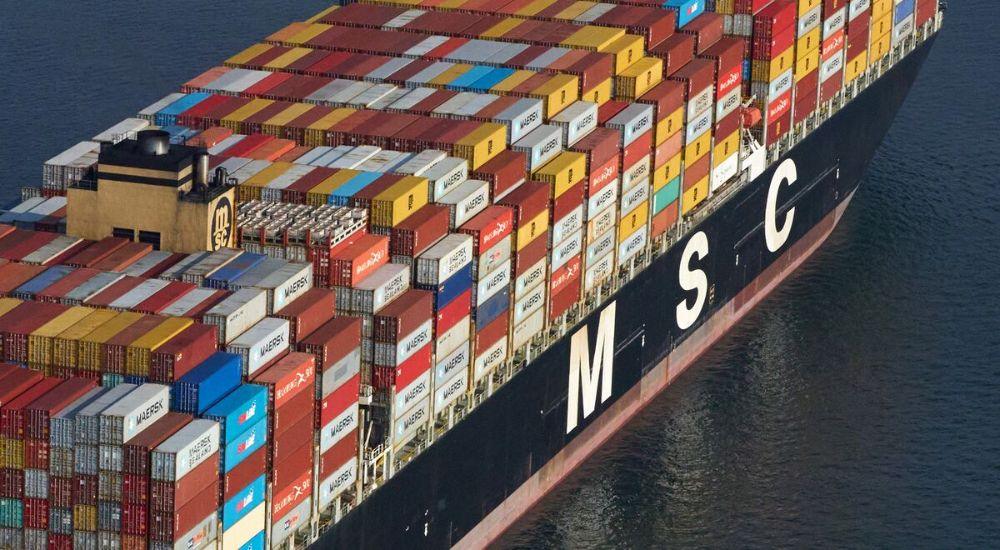A group under the auspices of the Citizens Whistleblowers Coalition (CWC) have sent a petition to President Bola Tinubu, urging him to order an investigation into the alleged unfair business practices of Mediterranean Shipping Company (MSC), a foreign shipping company operating in Nigeria.
According to the coalition in a petition signed by its Programme Officer, Nafiu Ibrahim; Officer Communication and Liaison, Ella Susan and Officer, Socio-Economic Rights, Dodeye Arikpo, they appealed to the president to probe MSC for alleged economic sabotage and judicial subversion.
Speaking on Saturday, the whistleblowers said the probe should center on MSC practices against Nigerian shippers, including unfair container deposit charges, illegal detention of shipments, and unfair demurrage charges.
The stakeholders said they resorted to writing the petition after MSC refused to honour the National Assembly’s invitations, disregarded the minister of blue economy’s memo on container deposit charges, and insisted on an exclusive jurisdiction clause that required all disputes in Nigeria to be litigated in London.
The petitioners insisted that MSC’s unfair business practices directly impacted the Nigerian economy and had led to high costs of goods and services being passed on to the poor masses by importers.
They explained that the petition became important because they believed that the company’s practices were contrary to several provisions of the Federal Competition and Consumer Protection Commission Act, the 1999 constitution, and other acts of the National Assembly.
They said: “We are committed to combating corruption and unfair business practices in all its forms while advocating for good governance so as to create a more just, egalitarian and equitable society.
“We write to bring to your kind attention the ill treatment and oppression of Nigerians in the hands of Mediterranean Shipping Company (MSC), a shipping company operating in Nigeria. Without doubt, Nigeria is generally an import dependent country as it relies largely on the importation of goods to fuel her economy.
“According to World Bank data, Nigeria’s import to GDP ratio is around 12%, and MSC, being the biggest shipping line in the world, accounts for majority of the imports into Nigeria.
“We note however, that over the years MSC has perpetrated unfair business practices against Nigeria and Nigerian shippers. Some of the practices include unfair container deposit charges, illegal and unlawful detention of shipments contrary to Nigeria laws, unfair demurrage charges, obnoxious detention charges, and unfair, unjust and unreasonable clauses.
“Most of the business practices of MSC are contrary to several provisions of the Federal Competition & Consumer Protection Commission Act. MSC’s ill treatment of Nigerians directly impacts on the economy as it leads to high cost of goods and services in Nigeria.
“It is on record that several complaints have been raised by many companies and groups in Nigeria. However, MSC continues to perpetrate its unfair practices.
“Surprisingly, the Federal Competition & Consumer Protection Commission (FCCPC), primarily charged under the FCCPA with policing these unfair practices, has remained silent and failed to investigate and bring MSC to book.
“Notably, the unfair container deposit charges running into billions of naira brought about the intervention by the minister of blue economy who directed a replacement of the container deposit fee with an indemnity scheme, but MSC has refused to implement this indemnity scheme but has instead continued to enforce its unscrupulous container charges.”
The petitioners bemoaned an exclusive jurisdiction clause in MSC’s bill of lading, which required all disputes against the company to be litigated in the High Court in London, United Kingdom.
The coalition argued that such clause was oppressive and unreasonable and had imposed hardship on Nigerian shippers, who were expected to incur significant expenses to litigate disputes in London.
They said: “One of the most oppressive and unfair business practices of MSC which recently came to light is an obscure exclusive jurisdiction clause in MSC bill of lading which practically places MSC beyond the reach of Nigerian laws and the Nigerian court system for any goods shipped to Nigeria.
“MSC’s bill of lading which contains the exclusive jurisdiction clause means that Nigerian shippers cannot sue MSC in Nigeria and every dispute against MSC must be litigated in the High Court in London, United Kingdom.
Read Also:
- NIMASA prioritises indigenous shipping development, says director general
- Gov Otu receives new navigational charts for Bakassi deep seaport
- Whistle Blowing Group accuses shipping giant of ₦3 Trillion deposit scam, legal evasion, threat to sovereignty
“In other words, the obscure exclusive jurisdiction clause is to the effect that MSC cannot be sued in Nigeria”.
The petitioners made a reference to the recent decision of the London High Court in Case No: CL-2024-000700, saying it further confirmed MSC’s oppression of Nigerians.
“In that case, MSC obtained an anti-suit injunction against a Nigerian company, Interglobal Limited relying on the exclusive jurisdiction clause in its Bill of Lading”, they said.
The whistleblowers appealed to Tinubu to intervene and act decisively to address MSC’s unfair business practices, urging the government to conduct a full investigation of MSC and call the company to order.
They insisted that investigation should focus on alleged economic sabotage, tax evasion, and regulatory violations, demanding that MSC should be compelled to respect Nigerian laws and the court system, particularly S20 of the Admiralty Jurisdiction Act, which vests jurisdiction in the Federal High Court for admiralty matters connected with Nigeria.
They also appealed to Tinubu to mandate the Federal Inland Revenue Service (FIRS) to audit MSC’s declared revenues and assess the accuracy of its tax remittances, given the company’s significant revenue generation in Nigeria.






